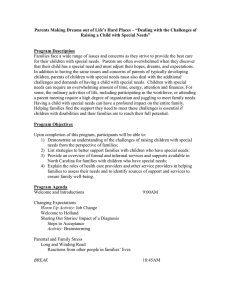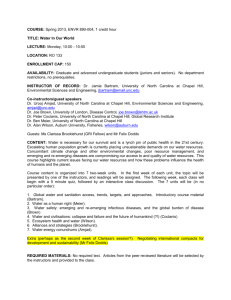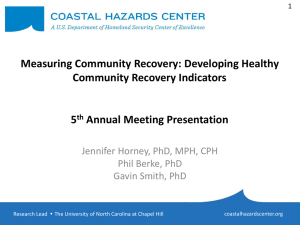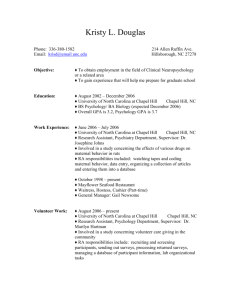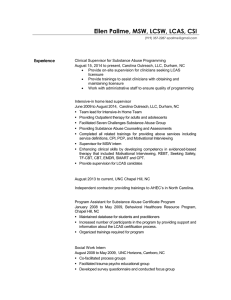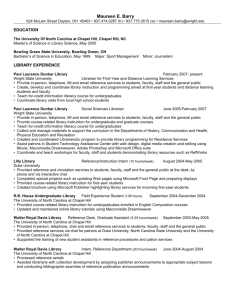2004-2005 Distinguished Lecturers
advertisement
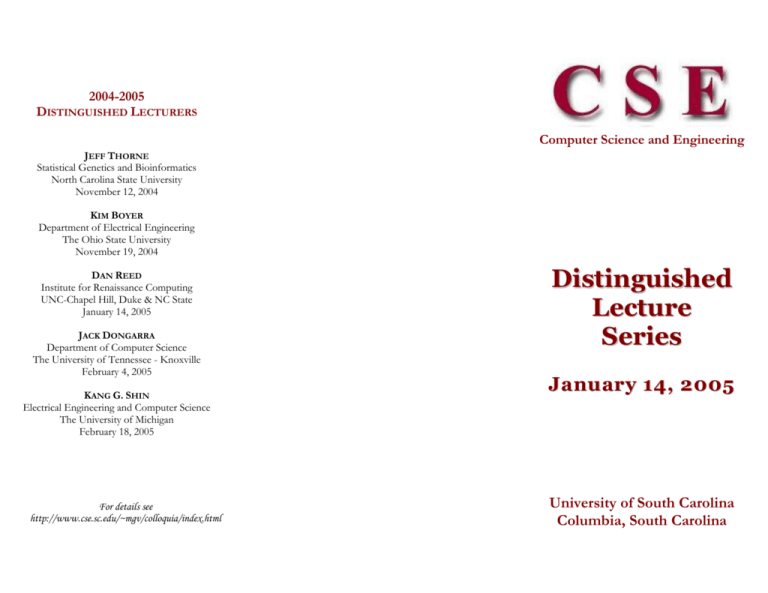
2004-2005 DISTINGUISHED LECTURERS Computer Science and Engineering JEFF THORNE Statistical Genetics and Bioinformatics North Carolina State University November 12, 2004 KIM BOYER Department of Electrical Engineering The Ohio State University November 19, 2004 DAN REED Institute for Renaissance Computing UNC-Chapel Hill, Duke & NC State January 14, 2005 JACK DONGARRA Department of Computer Science The University of Tennessee - Knoxville February 4, 2005 KANG G. SHIN Electrical Engineering and Computer Science The University of Michigan February 18, 2005 For details see http://www.cse.sc.edu/~mgv/colloquia/index.html Distinguished Lecture Series January 14, 2005 University of South Carolina Columbia, South Carolina “Computing Challenges: Scalability and Interdisciplinary Applications” PROFESSOR DAN REED Dan Reed is the Chancellor’s Eminent Professor at the University of North Carolina at Chapel Hill, as well as the Director of the Renaissance Computing Institute (RENCI), a venture supported by the three universities – the University of North Carolina at Chapel Hill, Duke University and North Carolina State University – that is exploring the interactions of computing technology with the sciences, arts and humanities. Reed also serves as ViceChancellor for Information Technology and Chief Information Officer for the University of North Carolina at Chapel Hill. Dr. Reed is a member of President George W. Bush’s Information Technology Advisory Committee, charged with providing advice on information technology issues and challenges to the President, and he chairs the subcommittee on computational science. He is a board member for the Computing Research Association, which represents the interests of the major academic departments and industrial research laboratories. He was previously Director of the National Center for Supercomputing Applications (NCSA) at the University of Illinois at Urbana-Champaign, where he also led National Computational Science Alliance, a consortium of roughly fifty academic institutions and national laboratories that is developing next-generation software infrastructure of scientific computing. He was also one of the principal investigators and chief architect for the NSF TeraGrid. He received his PhD in computer science in 1983 from Purdue University. by Da n R e e d UNC at Chapel Hill Duke University NC State University Friday, January 14, 2005 Amoco Hall Swearingen Engineering Complex (SWGN 1C01) 2:30 pm Refreshments immediately following in the lobby area outside Amoco Hall. ABSTRACT Legend says that Archimedes remarked, on the discovery of the lever, “Give me a place to stand, and I can move the world.” As an intellectual lever, computing allows researchers and practitioners to bring to life theoretical models of phenomena when economics or other constraints preclude experimentation. Computing also allows us to capture and analyze the torrent of experimental data being produced by a new generation of scientific instruments and sensors, themselves made possible by advances in computing and microelectronics. Finally, computing, via high-speed networks and distributed collaboration systems, brings people and talent together across the barriers of time and space. Simply put, computing pervades all aspects of science and engineering – “science” and “computational science” have become largely synonymous. However, we face major challenges. Systems built from commodity processors dominate highperformance computing today, with systems containing thousands of processors now being deployed. Similarly, large-scale Grids containing hundreds of thousands of sites are being contemplated, developed and deployed. As node counts for multi-teraflop systems grow to tens of thousands, with proposed petaflop systems likely to contain hundreds of thousands of nodes, we must rethink traditional assumptions about software scaling and manageability and hardware reliability. This talk will examine a set of interdisciplinary application domains and the implications of those domains for system scalability, fault tolerance and next generation technology.
